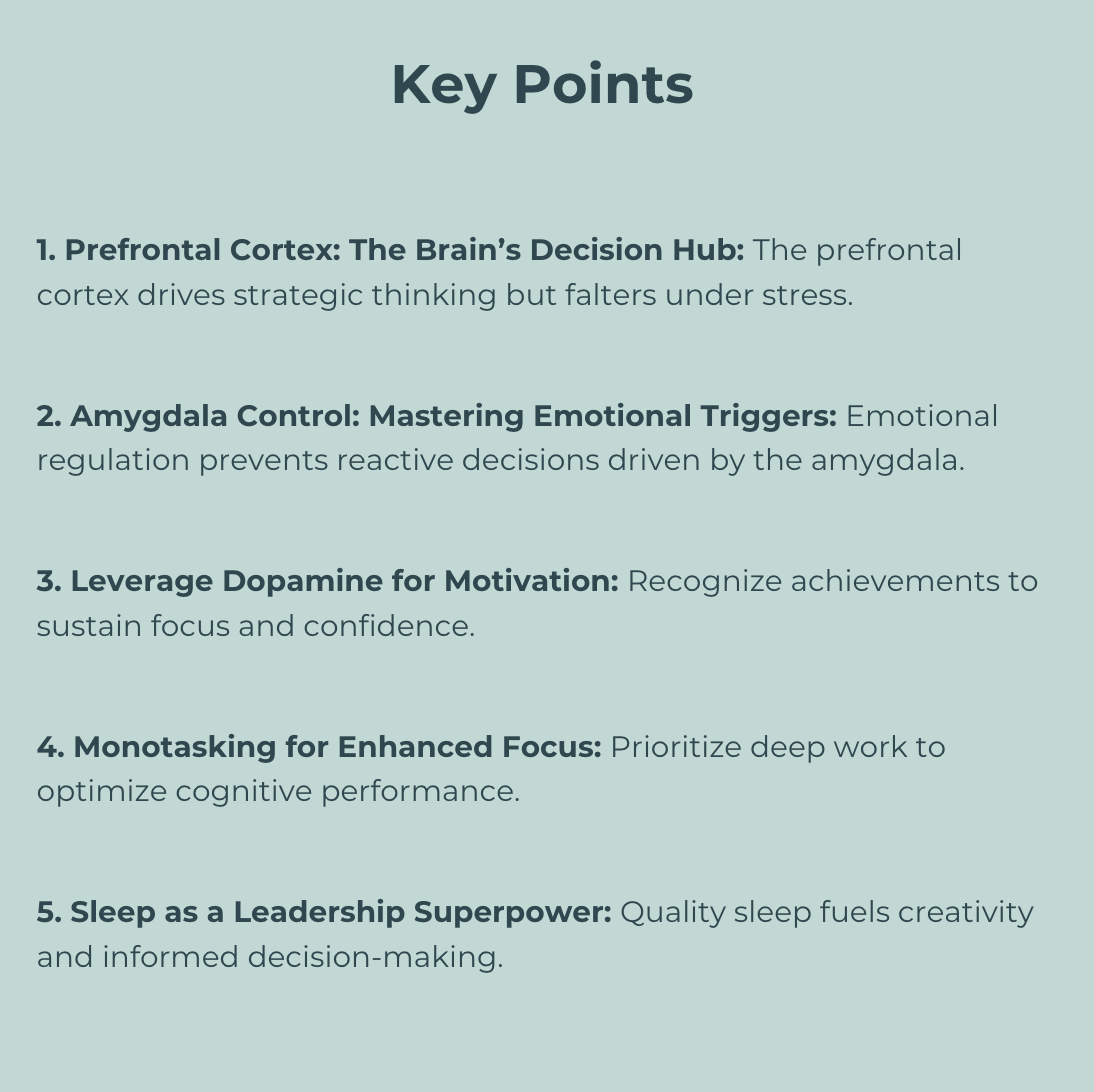The Neuroscience of Leadership: How Understanding Brain Function Can Improve Executive Decision-Making
What to Consider When Reading
How can stress management practices protect cognitive function during high-pressure decision-making?
In what ways can understanding the brain’s reward system improve team motivation and performance?
In the high-stakes world of leadership, decisions shape outcomes. From navigating a company through market shifts to resolving complex team dynamics, effective decision-making is the cornerstone of successful leadership. But have you ever wondered what goes on inside the brain during those pivotal moments?
Understanding the neuroscience of leadership can offer executives a powerful edge. By exploring how the brain processes information, manages stress, and weighs options, leaders can refine their decision-making skills and foster environments where clear thinking thrives. Let’s dive into the fascinating interplay between brain function and leadership to uncover strategies that can transform how you lead.
How the Brain Influences Leadership
Prefrontal Cortex: The Executive Center
The prefrontal cortex (PFC) is the brain’s control tower, responsible for decision-making, problem-solving, and self-regulation. When you weigh the pros and cons of a decision or brainstorm solutions, your PFC is hard at work. However, this region is highly sensitive to stress and fatigue, which can impair its function, leading to rash decisions or analysis paralysis.Amygdala: The Emotional Alarm System
The amygdala acts as the brain’s threat detector, triggering fight-or-flight responses when stress arises. While this response is vital in genuinely dangerous situations, it can backfire in leadership. High-pressure environments can cause the amygdala to hijack the brain, making emotionally charged decisions more likely. Leaders who understand this mechanism can employ strategies to stay calm and regain control.Dopamine and Decision-Making
Dopamine, the brain’s "reward" neurotransmitter, plays a crucial role in decision-making by reinforcing behaviors that lead to positive outcomes. While dopamine boosts motivation and confidence, too much of it can lead to overconfidence and risk-taking. Striking a balance is essential for sound leadership decisions.
Practical Strategies for Neuroscience-Informed Leadership
Manage Stress to Protect Clear Thinking
Chronic stress floods the brain with cortisol, impairing the PFC and leading to reactive rather than strategic decisions. Leaders can combat this by incorporating mindfulness practices, deep breathing, or short mental breaks into their routines. These strategies lower cortisol levels, helping the brain function optimally under pressure.Strengthen Emotional Regulation
When the amygdala is triggered, leaders may respond emotionally rather than rationally. Techniques like cognitive reappraisal—reframing how you perceive a stressful situation—can reduce emotional reactivity. For example, viewing a tough conversation as an opportunity for growth rather than a conflict can help maintain composure and clarity.Leverage the Brain’s Reward System for Motivation
Use dopamine strategically to boost team morale and decision-making. Recognize milestones, celebrate small wins, and set achievable goals to keep yourself and your team motivated. By providing regular positive reinforcement, you can sustain a cycle of confidence and progress.Improve Focus Through Monotasking
The brain thrives when it focuses on one task at a time. Multitasking splits attention and depletes cognitive resources. Leaders can enhance focus by prioritizing tasks, eliminating unnecessary distractions, and practicing deep work—uninterrupted time for high-priority decisions.Use Sleep to Recharge Cognitive Power
Sleep is essential for memory consolidation and problem-solving. During sleep, the brain clears out waste products, recharges its energy stores, and strengthens neural connections. Leaders who prioritize quality sleep are better equipped to make creative, informed decisions.
Neuroscience and Team Decision-Making
Understanding how the brain functions doesn’t just improve individual leadership—it also helps in team dynamics. Here’s how neuroscience can enhance collective decision-making:
Foster Psychological Safety
The brain’s natural fear of rejection can stifle creativity and honest input in team settings. Leaders who create psychologically safe environments encourage team members to share ideas without fear, leading to better decisions and innovation.Balance Group Dynamics
Too much agreement (groupthink) or too much conflict can derail decision-making. Encouraging constructive debates while maintaining mutual respect allows teams to consider diverse perspectives and arrive at better solutions.Encourage Dopamine-Driven Momentum
Celebrate team achievements to boost motivation. Acknowledging progress activates dopamine, fostering a sense of accomplishment and energizing the team for future challenges.
The Future of Leadership: Neuroscience as a Guide
As we continue to understand the brain’s complexities, neuroscience will play an increasingly prominent role in leadership development. From refining emotional intelligence to optimizing decision-making under pressure, leveraging neuroscience offers leaders a scientific framework for growth.
By understanding how your brain works—and how to support it—you can lead with greater clarity, confidence, and creativity. The next time you face a big decision, remember: it’s not just about what’s on the table—it’s about how your brain approaches it. With the right tools and strategies, you can turn your brain into your most powerful leadership asset.
Final Thoughts
Leadership is as much a mental endeavor as it is a strategic one. By understanding how the brain processes decisions, reacts to stress, and seeks rewards, leaders can cultivate habits that align with their neurological strengths. Whether it’s managing stress to protect the prefrontal cortex or celebrating milestones to harness dopamine, neuroscience offers actionable strategies to enhance leadership.
In the fast-paced world of executive decision-making, leveraging brain science isn’t just a nice-to-have—it’s a necessity. By incorporating these insights into your leadership style, you’ll not only improve your decision-making but also create a more motivated, resilient, and high-performing team.
Take the First Step Toward your Well-Being
At The Mental Game, we know that navigating life’s challenges requires more than just determination—it requires the right support and strategies tailored to your unique needs. Our team of seasoned professionals is dedicated to helping you build the mental resilience and skills necessary to excel, no matter what life throws your way.
Visit The Mental Game to learn more about our services and schedule your FREE consultation today and take the first step toward a healthier, more resilient mind.

